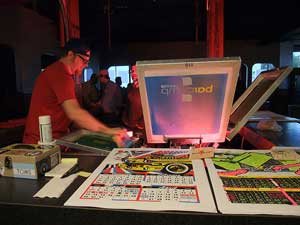Sheerly Avni is a film and culture writer guest-blogging for Mother Jones from Austin’s South by Southwest Festival. Read her first dispatch here.
Part Two: One Man’s Garbage Is Another Man’s Prayer
The best way to introduce the documentary Garbage Dreams is to introduce one of its three protagonists, a young Egyptian named Adham, who addressed an adoring crowd last night during the film’s post-premiere Q&A.
“I had to quit working when I was eight,” he said through a translator. “I had to drop out of school at age 8 to help my family. I was ashamed of my job as a zaballeen. But after I attended The Recycling School, I also learned computers, health, and hygiene, I became very proud of my profession, and I realized that my job is as important as a job or doctor: If the zaballeen do not collect the garbage every day…cities will stink.”
Adham is one of Cairo’s 60,000 zaballeen, garbage collectors who eke out a living gathering, sorting, and recycling 80 percent of the cities’ waste. Until recently, their profession afforded them a modicum of economic security, if no real chance at social mobility, but as the city has turned to subcontracting out collections to foreign companies, the entire community has suffered. Director Mai Iskander spent several years following the struggles of three remarkably charismatic boys—now young men—fighting to protect their trade, all under the careful guardianship of a teacher at The Recycling School, a nonprofit dedicated to educating the young zaballeen, academically as well as professionally.
With no preaching, no lazy text placards, and a deep faith in the boys’ ability to tell their own compelling story without comment, Iksander offers up a gripping account of what it means to fight for the right to work with honor, as well as introducing you to three young men you’ll not soon forget. The future of their profession may be in danger—as well as their vision of all garbage as, in their own words, “a gift from God”—but this movie could help save it.
Look out for a particularly striking sequence set on a visit to a Wales recycling factory—with Ahmad serving as both enthusiastic tourist (“Cars here stop to let you cross the street!”) and skeptical pro (“No precision,” he sniffs, watching shards of broken glass make their way down a conveyer belt to a landfill).
See indieWIRE for an interview with the filmmaker.
In my next dispatch: cultural shifts in the workplace, take 42. “I guess you’ll find me when you want to get wasted.”—parting words of Cinematical’s managing editor Scott Weinbergto two of his bloggers.
















